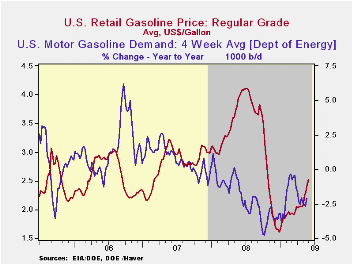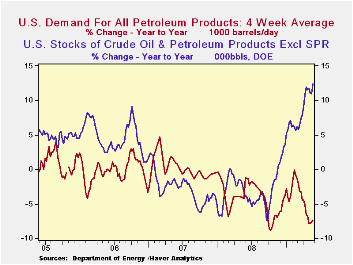 Global| Jun 02 2009
Global| Jun 02 2009Gasoline Prices Rise Further Reflecting Strength In Crude Oil Prices
by:Tom Moeller
|in:Economy in Brief
Summary
News of a rebound in the U.S. economy has generated the suspicion that more consumers will take to the roads on longer journeys. So far, the evidence of a recovery in driving is limited, but the energy market nevertheless has reacted [...]

News of a rebound in the U.S. economy has generated the suspicion that more consumers will take to the roads on longer journeys. So far, the evidence of a recovery in driving is limited, but the energy market nevertheless has reacted in advance with higher prices. Regular gasoline prices last week moved even higher to an average $2.52 per gallon of regular. The gains have taken prices up by 91 cents, or by more than one-half, from the December low to the highest level since late-October. Yesterday, the cash market price for a gallon of regular gas rose further to $1.90 per gallon versus $1.85 averaged last week. These also were the highest prices since last October. The figures are reported by the U.S. Department of Energy and can be found in Haver's WEEKLY & DAILY databases.
So far the evidence of a rebound in driving is limited. The figures for miles driven have rebounded from this past winter but that's usual as the weather warms. Year-to-year, economic weakness continues to lower gasoline demand, last week by 2.1%. That is, however, a less severe shortfall than during last autumn's 5% y/y decline. The change in demand is measured using the latest four weeks versus the same four weeks in 2008. Demand for all petroleum products was down 7.3% y/y in the latest week led by a 38.5% drop in demand for residual fuel oil and a 13.4% drop in distillate demand. These numbers also are available in Haver's OILWKLY database.
Higher crude oil prices have accompanied the rise in gasoline costs. Crude prices averaged $64.32 last week for a barrel of West Texas Intermediate, up from the December low of $32.37 per barrel. Yesterday, crude oil prices rose even further to $68.58. Prices reached a high of $145.66 last July. The latest price increases occurred despite a 3.1% year-to-year rise in crude oil production during the latest four weeks. In addition, they have occurred despite a 12.3% y/y rise in inventories of crude oil & petroleum products. The figures on crude oil production and inventories are available in Haver's OILWKLY database.
Finally, the gains in the price of natural gas paused last week and it fell back to $3.60 per mmbtu (-69.2% y/y). The latest price was nearly the lowest since 2002 and is down by two-thirds from the high reached in early-July of $13.19/mmbtu.
U.S. Treasury Secretary Timothy F. Geithner's speech titled The United States and China, Cooperating for Recovery and Growth is available here
| Weekly Prices | 06/01/09 | 05/25/09 | Y/Y | 2008 | 2007 | 2006 |
|---|---|---|---|---|---|---|
| Retail Regular Gasoline ($ per Gallon, Regular) | 2.52 | 2.44 | -36.5% | 3.25 | 2.80 | 2.57 |
| Light Sweet Crude Oil, WTI ($ per bbl.) | 64.32 | 60.48 | -49.9% | 100.16 | 72.25 | 66.12 |
Tom Moeller
AuthorMore in Author Profile »Prior to joining Haver Analytics in 2000, Mr. Moeller worked as the Economist at Chancellor Capital Management from 1985 to 1999. There, he developed comprehensive economic forecasts and interpreted economic data for equity and fixed income portfolio managers. Also at Chancellor, Mr. Moeller worked as an equity analyst and was responsible for researching and rating companies in the economically sensitive automobile and housing industries for investment in Chancellor’s equity portfolio. Prior to joining Chancellor, Mr. Moeller was an Economist at Citibank from 1979 to 1984. He also analyzed pricing behavior in the metals industry for the Council on Wage and Price Stability in Washington, D.C. In 1999, Mr. Moeller received the award for most accurate forecast from the Forecasters' Club of New York. From 1990 to 1992 he was President of the New York Association for Business Economists. Mr. Moeller earned an M.B.A. in Finance from Fordham University, where he graduated in 1987. He holds a Bachelor of Arts in Economics from George Washington University.
More Economy in Brief
 Global| Feb 05 2026
Global| Feb 05 2026Charts of the Week: Balanced Policy, Resilient Data and AI Narratives
by:Andrew Cates






